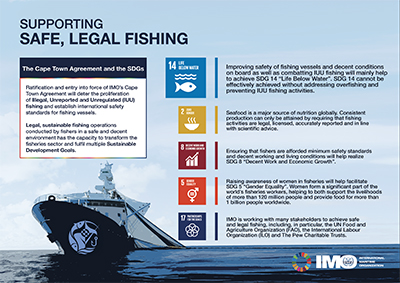IMO Ministerial Conference - Safe fishing, Legal fishing

Ministerial Conference on Fishing Vessel Safety and Illegal, Unreported and Unregulated (IUU) Fishing, organized by IMO and the Government of Spain, Torremolinos, Málaga, Spain, 21-23 October 2019
The Conference promoted ratification of the Cape Town Agreement, a key IMO treaty for safety of fishing vessels. The entry into force of the Cape Town Agreement will help deter the proliferation of illegal, unregulated and unreported (IUU) fishing, by establishing international safety standards for fishing vessels.
The Conference was co-hosted by IMO and the Government of Spain, with the kind support of the Food and Agriculture Organization of the United Nations (FAO) and The Pew Charitable Trusts. Download key information on the Torremolinos Conference.
Photos of the Conference: photos
Photos of the signing of the Torremolinos Declaration: Photos.
Presentations - see under Conference Programme below to download presentations.
Conference outcome
During the conference (21-23 October), nearly 50 States signed the Torremolinos Declaration, publicly indicating their determination to ratify the Agreement by the target date of 11 October 2022 (tenth anniversary of the adoption of the Agreement).
Read more here.
Torremolinos Declaration
As well as taking action to ensure entry into force, States signing the Torremolinos Declaration, pledged to promote the Agreement, recognizing that the ultimate effectiveness of the instrument depends upon the widespread support of States, in their capacities as flag States, port States and coastal States. They also denounced the proliferation of IUU fishing, recognizing that international safety standards for fishing vessels will provide port States with a mandatory instrument to carry out safety inspections of fishing vessels, thereby increasing control and transparency of fishing activities.
Forty-eight countries have so far signed the declaration: Argentina, Bangladesh, Belgium, Belize, Central African Republic, Chile, China, Congo (Republic of), Cook Islands, Costa Rica, Croatia, Democratic Republic of the Congo, Denmark, Ecuador, Fiji, Finland, France, Gabon, Germany, Ghana, Guinea (Republic of), Guinea Bissau, Iceland, Indonesia, Ireland, Kiribati, Lebanon, Liberia, Marshall Islands, Mozambique, Namibia, Netherlands, New Zealand, Nicaragua, Nigeria, Norway, Panama, Papua New Guinea, Peru, Republic of Korea, Sao Tome and Principe, Sierra Leone, South Africa, Spain, Togo, Uganda, United Kingdom, Vanuatu. The Declaration is open for further signatures until 21 October 2020.
Conference resolutions and Torremolinos Statement
The Conference adopted two resolutions. (Download Resolutions)
Conference resolution 1 adopted the Torremolinos Statement on the Cape Town Agreement of 2012 and combating illegal, unregulated and unreported fishing. The Statement highlights the importance of the Cape Town Agreement and the work on combating IUU fishing. It calls on States to ratify the Cape Town Agreement; urges States to take actions to prevent deter and eliminate IUU fishing; encourage States to ratify and promote the STCW-F Convention on training of fishing vessel personnel; calls upon FAO, ILO, IMO to continue to work together in the fishing sector; and requests IMO to continue to prove technical assistance to States who request it in order to accede to and implement the Cape Town Agreement.
The second resolution expresses appreciation to Spain for hosting the conference.
Is there a link between safe fishing and the UN SDGS?
Yes. Ensuring safe and sustainable fishing is clearly linked with the achievement of the targets of UN SDG 14 on the oceans. There are also clear links with other UN SDGs, including those relating to poverty, hunger, education and training, infrastructure and partnerships. Download the fact sheet on the Cape Town Agreement and the SDGs. Seafood is a highly-sought after and nutritious meal for millions of people across the world - and an essential food protein in many developing countries. |  |
